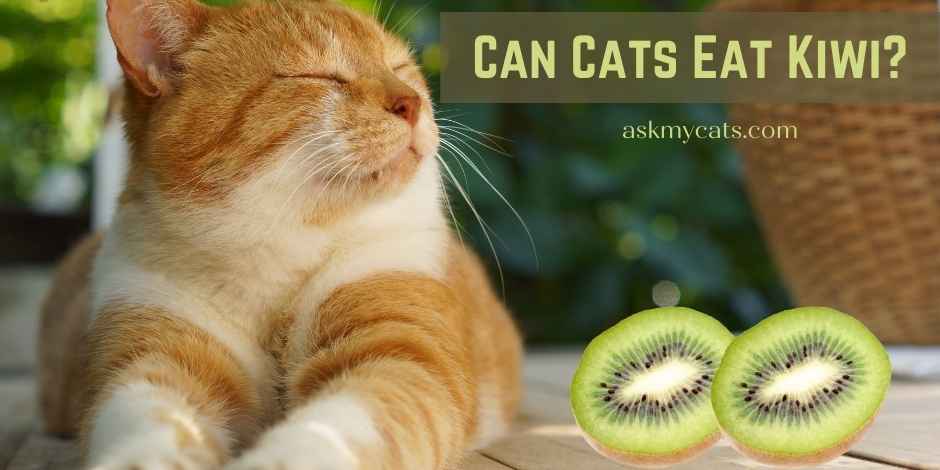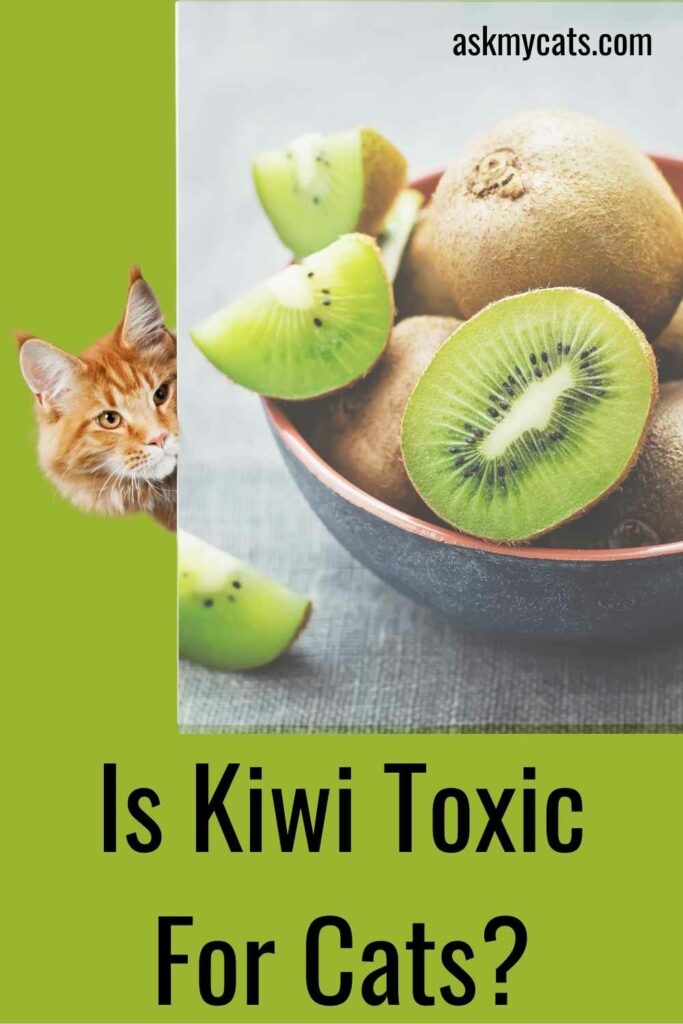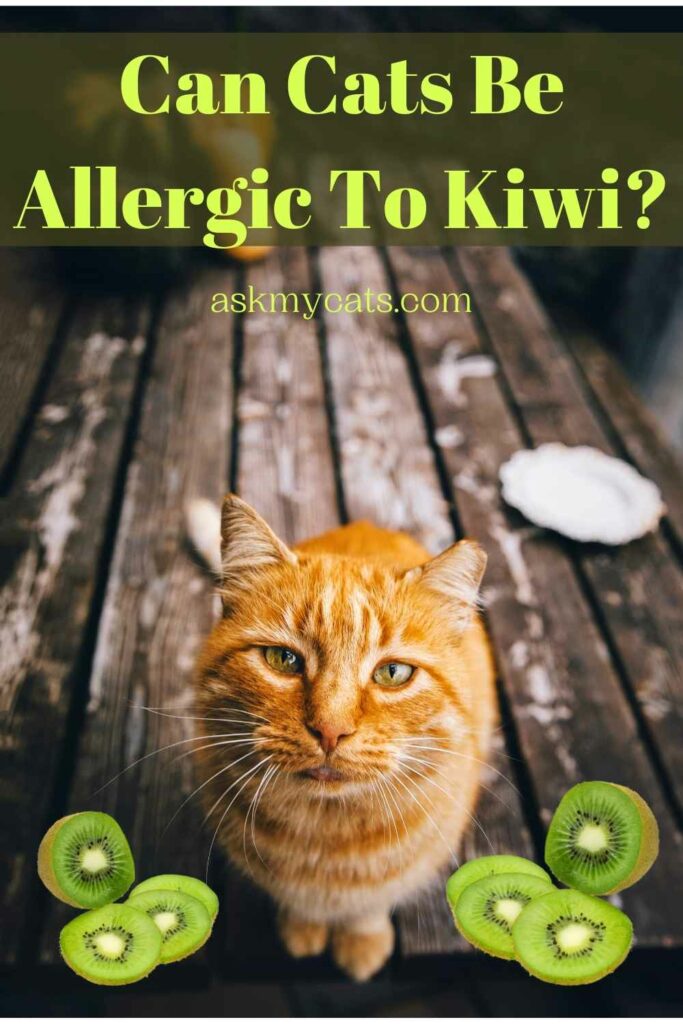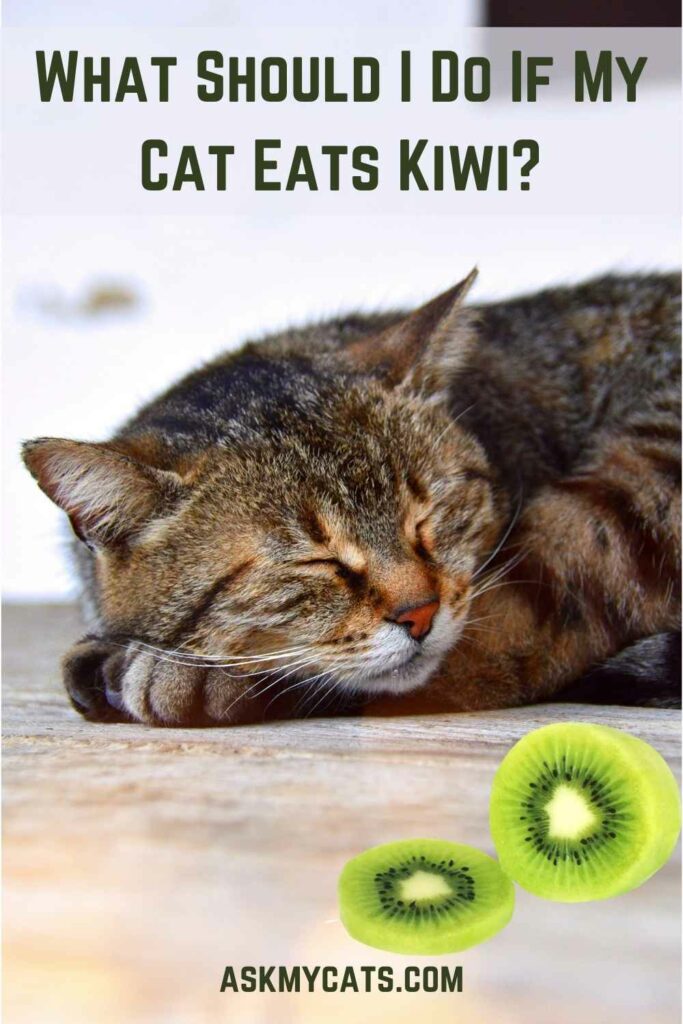The kiwifruit is well-known for its vibrant color, delicious flavor, and extensive nutritional profile.
Kiwi is considered a superfood by many nutritionists and medical professionals. As a superfood, the fruit provides us with a variety of vitamins and minerals, as well as aiding in the prevention of numerous medical diseases.
Yes, kiwi is non-toxic to cats and can give some nutritional benefits! While Kiwi is non-toxic, there are certain risks to be aware of before feeding it to your cat.
In this post, we’ll look at some of the significant gains of feeding Kiwi to your cat, as well as some of the potential health risks.


Give Your Cat the Perfect Day
Get the Free Ebook!
Do Cats Like Kiwi?
Cats are naturally inquisitive creatures, and most of them would jump at the chance to try a bite of kiwi.
However, you never know whether or not your kitten will like kiwi. She may acquire an immediate fondness for the fruit or develop an aversion to it.
The actual question is whether your cat will benefit from the health and nutritional characteristics of kiwi.
Cats are obligate carnivores, meaning that they can survive nearly entirely on animal protein. Your cat’s digestive tract is more efficient at processing meat than plant-based meals since it is an obligate carnivore.
As a result, your cat will not benefit from kiwi in the same manner that people do. Worse, there are a slew of additional things that may go wrong if you give kiwi to your cat carelessly.
Is Kiwi Toxic For Cats?
Giving your cat kiwi is totally safe as long as it is consumed in moderation and the skin is removed.

Remember that cats are obligate carnivores, and while tiny amounts of fruit may provide some nutritional value, they do not require fruit to exist, and fruits and vegetables should not make up a significant portion of their diet.
Animal proteins such as chicken, fish, and beef can provide all of a cat’s nutritional needs, and fruit should only be given as a special treat.
Cats, unlike humans, do not have the same taste receptors as humans and hence are unable to detect sweetness, so they will not be able to enjoy the delightful sweet flavor of Kiwi that we enjoy.
Cats may safely eat kiwis as long as you give them to them in moderation.
Now that cats can eat kiwis, you might be wondering how these fruits would help your cat in terms of nutrition and health.
A serving size of two kiwis typically comprises the following nutritional elements:
- Calories: 90
- Cholesterol: 0 mg
- Sodium: 0 mg
- Fat: 1 g
- Fiber: 4 g
- Sugars: 13 g
- Carbohydrate: 22 g
Kiwis are high in minerals including calcium, iron, and potassium, as well as vitamins A and C, in addition to the nutrients listed above.
Health Advantages Of Kiwis For Cats
1. Enhanced Digestion
Dietary fibre is abundant in kiwis, as it is in other fruits. These fibres can help your cat’s digestion by providing the nutrients that her gut-friendly bacteria require.
Dietary fibre also aids digestion by bulking up your cat’s stool, which aids in the relief of digestive issues such as constipation and diarrhoea.
Kiwis’ fibre content may help with weight control in addition to assisting your cat’s digestion.
Fibre-rich meals, as you may well know, are excellent at making you feel full. When you sprinkle little amounts of kiwi over your cat’s usual diet, it will eat less yet feel fuller for longer.
2. Key To Good Immunity
Kiwis are also high in vitamin C, which is renowned for stimulating collagen synthesis. Vitamin C may help your cat’s coat seem firmer and shinier by boosting collagen production.
Kiwis’ rich vitamin C content helps with more than simply collagen synthesis. Vitamin C is also a well-known antioxidant. Vitamin C interacts with other antioxidants in the fruit, such as phenolic and carotenoids, to provide a synergistic effect.
The chemicals work together to prevent cell damage caused by oxidative stress generated by free radicals in your cat’s body. As a result, they may be able to help prevent chronic illnesses such as cancer and arthritis while also decreasing the early symptoms of ageing.
Can Cats Be Allergic To Kiwi?
Yes, eating kiwis can cause allergic responses in cats only if a good amount of kiwis are eaten by them.

The high sugar content of kiwis is the most evident issue with these fruits for cats.
Two kiwis provide 13 grams of sugar and 22 grams of carbs per serving. For most individuals, that is already much too high. That why would you want your kitten to ingest so much sugar defies sense.
Obesity and other chronic diseases such as diabetes and heart disease are linked to sugar-rich meals.
Worse yet, it’s worth noting that cats’ sweet taste receptors aren’t extremely sensitive.
This implies that your kitty pal may eat an excessive amount of kiwis without becoming overwhelmed by their sweet flavor.
Some of the common signs of kiwi allergy include;
- Stomach upset
- Diarrhea
- Abdominal pain
- Coughing
- Sneezing
- Runny eyes and nose
- Dilated pupils
- Irritability
The high sugar content in kiwis may cause tooth decay and other dental issues in your cat, in addition to raising his risk of obesity, diabetes, and heart disease.
Another typical disadvantage of giving kiwis to cats is the high fibre content of the fruit. We have discussed some of the scientifically confirmed health advantages of dietary fibre.
However, because a cat’s digestive tract isn’t suited for digesting plant-based meals, a lot of the fibre in kiwis may go undigested. A large amount of fibre in your kitten’s stomach has a laxative effect, which can cause diarrhoea and dehydration.
What Should I Do If My Cat Eats Kiwi?
If your cat has only eaten a tiny amount of kiwi, there is no need to be concerned. However, if you believe the cat has eaten more kiwi than she should, keep an eye on her for a few hours.

Keep an eye out for gastrointestinal issues such as diarrhoea or allergic responses such as coughing and sneezing.
Even if the cat shows no obvious indications of sickness, it’s a good idea to take him to the doctor. This is especially true if the cat has eaten a lot of kiwi fruit.
Kiwis are non-toxic to cats, so they can consume them in moderation without causing them any harm. If you decide to offer your cat Kiwi on occasion, be sure to peel it well first and only give it to them in little amounts.
Remember that cats don’t require fruit in their diets and can’t taste sweetness, so there’s no reason to feed them fruit when they can receive all of their nutritional needs from other, better sources.
There’s typically no need to be concerned if your cat gets to steal some Kiwi from your breakfast dish!
Can Cats Eat Kiwi Seeds?
Yes, cats can eat kiwi seeds because Vitamin C, vitamin K, vitamin E, folate, and potassium are all found in abundance in kiwi seeds.
They’re also high in antioxidants and contain a lot of fiber. The fuzzy brown skin, as well as the tiny black seeds, are edible, however many people prefer to peel the kiwi before eating it.
Eating simply kiwi seeds will not provide you with the same amount of energy as eating a whole kiwifruit. However, the little black seeds found in kiwifruit are edible and contain a variety of vital minerals, even if in small amounts.
Can Cats Eat Kiwi Skin?
It is not advisable for cats to eat kiwi skin because kiwi that has been peeled should only be fed to cats.
Half of a slice, sliced into little, bite-sized pieces, is the finest serving. Cats should only have half a piece every now and again, and it should be used in lieu of other treats rather than in addition to them.
The 10% rule takes effect, which states that a cat’s diet should contain no more than 10% treats. An entire kiwi has 90 calories, therefore a half slice may have anywhere from 7 to 15 calories depending on how it’s cut.
Another approach to offer kiwi is to finely chop it and mix it in with their normal food. This will provide your cat with the taste they like, but you won’t have to worry about them choking or refusing to eat their usual food.
Can Kiwi Kill Cats?
The high sugar content of kiwi makes it dangerous for cats and can cause death if they are taken in large quantities.
With 6.5 grams of sugar and 11 grams of carbohydrates in one kiwi, a cat’s risk of becoming fat and developing diabetes is considerably higher than that of people. Diabetes may kill cats, and obesity is unhealthy for them in general.
While none of these items will likely kill your cat (though choking May!), they will make life difficult for your cat, as well as for you when it comes time to clean up. Dehydration in cats may be serious rapidly due to their small size, so it’s absolutely something to be aware of.
Kiwi may be delightful for humans, but because cats are obligate carnivores (meaning cats must consume meat and don’t get much from anything else), kiwi is unlikely to be on their list of tasty treats.
Although kiwi has certain benefits for cats, it is not something they should try to live on because it lacks everything cats need to be healthy. However, if your cat takes a bite of your kiwi, it is unlikely to hurt them, provided they aren’t allergic and don’t try to eat the peel.
If you’re concerned, talk to your veterinarian and keep an eye on your pet.
Frequently Asked Questions
Are kiwi cubes good for cats?
Giving your cat a couple kiwis’ slices or cubes, on the other hand, is OK, even helpful. Vitamin K, which is required for the liver to produce blood clotting proteins, is abundant in kiwifruit. Copper, fiber, vitamin E, potassium, manganese, and folate are all abundant in kiwis.
What happens if cats eat kiwi?
A little piece of kiwi fruit, without the fuzzy outer peel, offers no actual threat to your cat. However, keep in mind that kiwi fruit contains an enzyme called actiniae, which can cause allergic responses in humans and sensitive cats.
Can dogs eat kiwi?
You should never offer a full kiwi to your dog because of its small size. An upset stomach or a serious case of diarrhea in a dog can be caused by a high fiber diet. Although the skin is edible, it is advisable to remove it before giving your dog kiwi.
Final Words
Kiwis are safe for cats to consume and pose no acute health risks.
Just make careful to peel the fruits before giving them to your cat because the skin might be bitter and difficult for him to eat. Above all, only feed kiwis to your cat in moderation.
Feel free to drop your questions in the comments section below!
